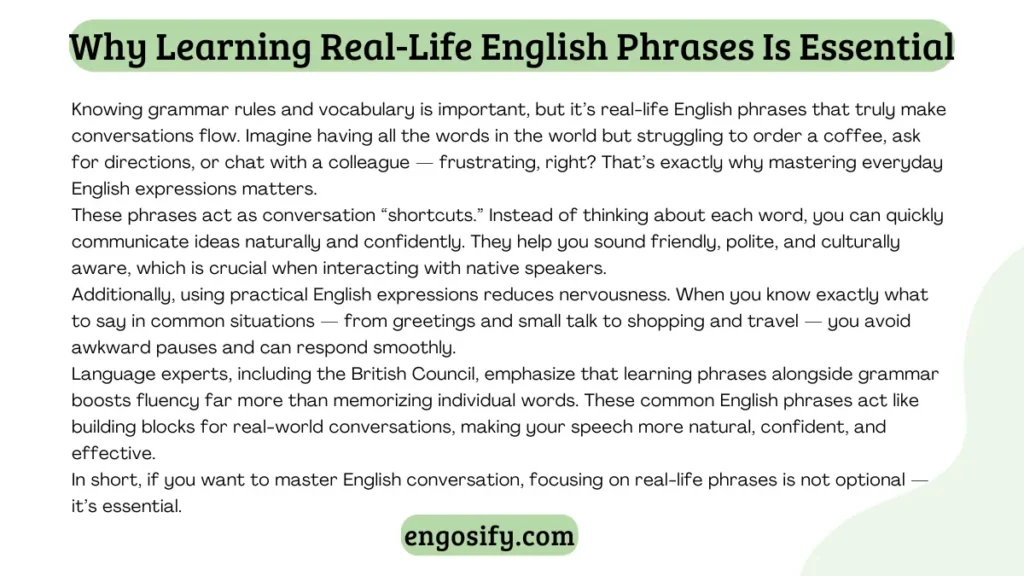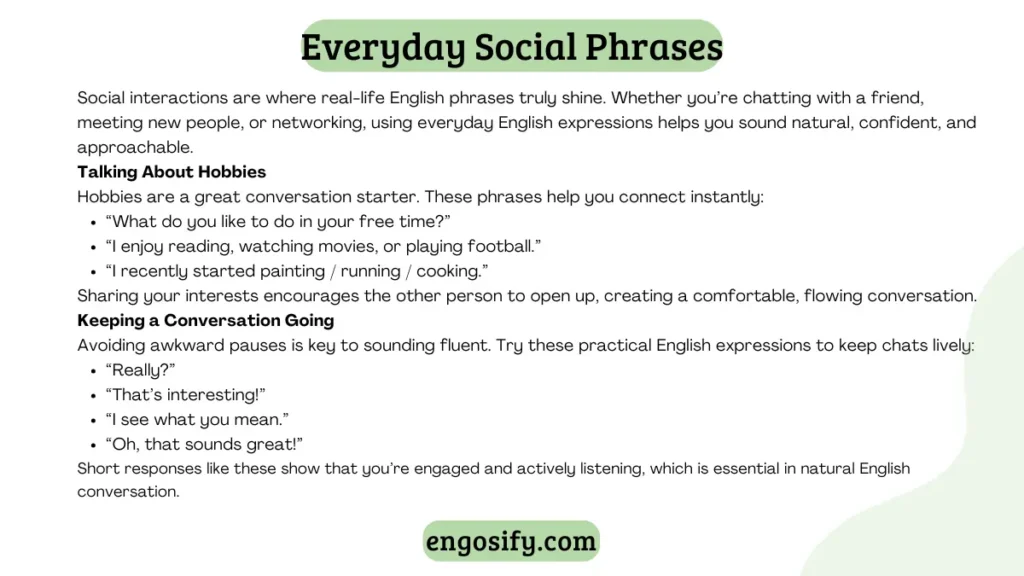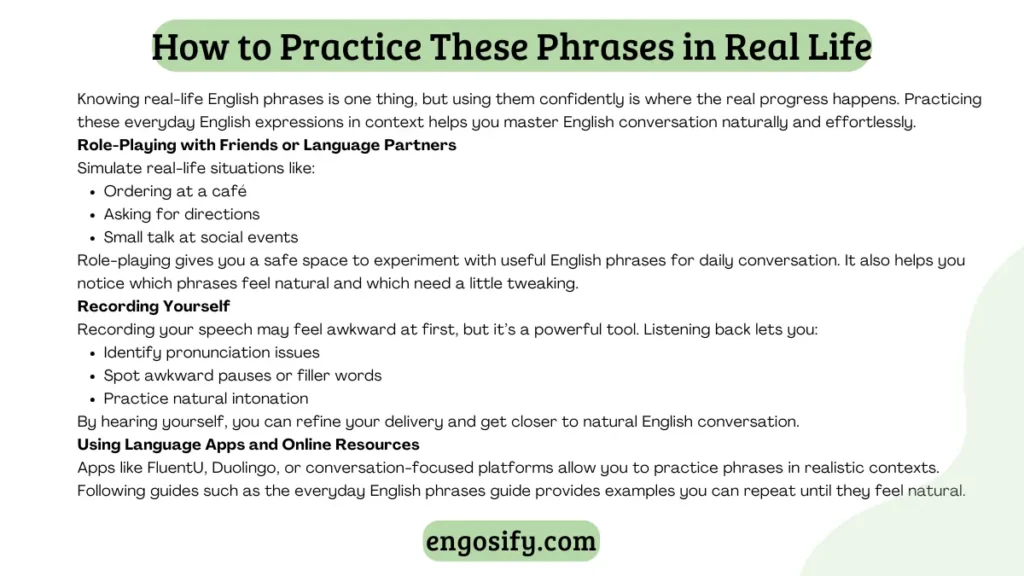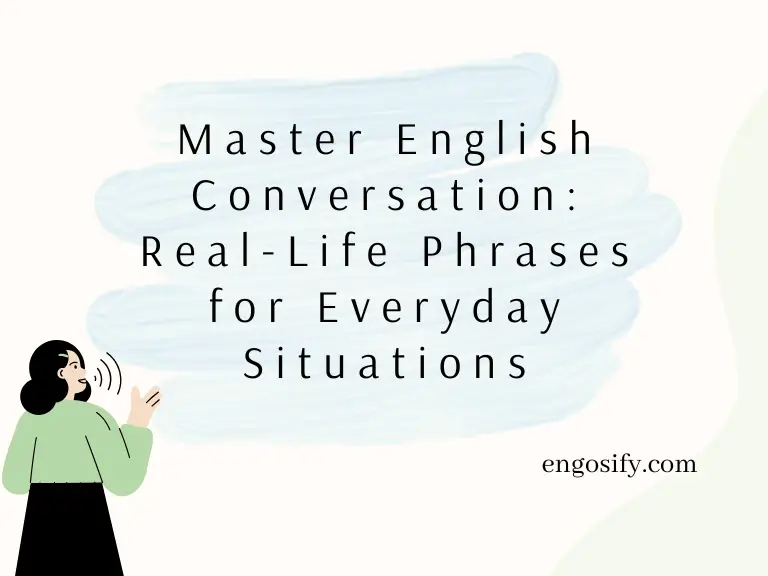When you’re learning English, grammar rules and vocabulary lists can feel endless. Yet, when you step into a café, hop on a bus, or meet someone new, you’ll quickly realize that real-life phrases are what keep conversations flowing naturally. This article will help you master English conversation by showing you useful English phrases for everyday life — from polite greetings to ordering food, asking for help, and even handling workplace chats. You’ll also pick up tips on how to practice these expressions so they roll off your tongue with ease.
Whether you’re a beginner who wants to sound more natural or a confident speaker looking to polish your style, these practical English expressions are like handy shortcuts. They’ll help you skip the awkward pauses, sound friendlier, and build connections faster. So, let’s dive in and discover why these real-life phrases matter so much.
Why Learning Real-Life English Phrases Is Essential
Imagine knowing hundreds of words but struggling to order a sandwich or start small talk with a stranger. Frustrating, isn’t it? That’s because textbook English and natural conversation aren’t quite the same. Real-life English phrases act like glue, holding your sentences together and making your speech sound smooth rather than robotic.
When you use common English greetings, small talk expressions, or polite phrases in English, you’re not just speaking; you’re also showing respect for cultural norms and social cues. This builds rapport and instantly makes you sound more confident.
Moreover, these everyday English expressions serve as “conversation templates.” Instead of inventing sentences on the spot, you’ll have ready-made lines to use, which can reduce nervousness and speed up your fluency. That’s exactly why language experts, like the British Council’s phrase collection, recommend learning real-life phrases alongside grammar and vocabulary.
Everyday Greetings and Introductions
When you first meet someone or bump into a friend, greetings are your golden ticket to starting a smooth conversation. They’re short, friendly, and set the tone for what follows. In fact, mastering a few common English greetings can instantly make you sound approachable and natural. Let’s break them down.
Basic Greetings
Sometimes, the simplest words make the biggest impact. Saying “Hi” or “Hello” never goes out of style, but you can also mix it up depending on the time of day:
- “Good morning” (before noon)
- “Good afternoon” (noon until early evening)
- “Good evening” (after 6 PM)
If you’re in a relaxed setting, “Hey!” or “What’s up?” adds a casual, friendly tone. These everyday English expressions help you sound less stiff and more like a native speaker.
Polite Introductions
Starting a conversation with a stranger? Politeness goes a long way. Some great openers include:
- “Nice to meet you.”
- “It’s a pleasure to meet you.”
- “How’s it going?”
These phrases don’t just introduce you; they also make the other person feel comfortable. According to the Cambridge Dictionary polite expressions, using polite language signals respect, which is key in English-speaking cultures.
Small Talk Starters
After the greeting, the tricky part is keeping the ball rolling. That’s where small talk expressions save the day. You might ask:
- “Where are you from?”
- “What do you do?”
- “How was your weekend?”
These aren’t just random questions. They’re conversation “hooks” that invite the other person to share more, making your interaction smoother and warmer. Sprinkle in short follow-ups like “Really?” or “That’s interesting!” to show you’re listening.
With these simple yet powerful phrases, you’ll be able to master English conversation in those crucial first minutes when impressions are formed.

Useful Phrases for Asking Questions
Even the most confident English speakers sometimes need directions, clarification, or a little help. Having a bank of practical English expressions ready makes these moments smoother and less stressful. These real-life English phrases will help you handle everyday situations politely and effectively.
Asking for Directions
Getting lost happens to everyone, especially in a new place. When it does, sounding polite and clear can make strangers more willing to help you. Try these:
- “Excuse me, could you tell me how to get to…?”
- “Am I going the right way to…?”
- “Is it far from here?”
Adding a friendly tone and using “Excuse me” softens your request and makes it sound respectful. These useful English phrases for daily conversation are lifesavers when traveling.
Asking for Clarification
Sometimes you’ll catch only part of what someone says — accents, background noise, or speed can all make things tricky. In these moments, don’t panic; just lean on common English phrases for clarification:
- “Could you repeat that, please?”
- “What does that mean?”
- “Sorry, I didn’t catch that.”
According to the everyday English phrases guide, these polite requests are common in daily interactions and help you avoid misunderstandings without sounding rude.
Asking for Help in General
Whether you’re in a store, on public transport, or at the doctor’s office, you may need assistance. Here are some go-to polite expressions in English:
- “Could you help me with this?”
- “I’m looking for…”
- “Is there someone who can assist me?”
These phrases are simple yet powerful. They show that you’re respectful while still expressing your needs clearly — a key step to mastering English conversation in real life.
Phrases for Shopping and Restaurants
Shopping or eating out is one of the best ways to practice everyday English expressions. Whether you’re at a market, a clothing store, or your favorite café, knowing the right real-life English phrases will make these interactions feel natural and stress-free.
In Shops
You’re browsing through clothes or groceries, and suddenly you need to ask a question. These useful English phrases for daily conversation are perfect:
- “How much does this cost?”
- “Do you have this in a different size/color?”
- “Can I try this on?”
- “I’m just looking, thank you.”
Adding “please” or “thank you” instantly softens your tone and makes you sound polite — a big plus in English-speaking countries.
In Restaurants
Ordering food in English doesn’t have to be intimidating. With a few common English phrases in your back pocket, you’ll glide through the process like a pro:
- “Could I see the menu, please?”
- “I’d like to order…”
- “Can we get separate checks, please?”
- “Could you recommend something popular?”
These expressions aren’t just functional; they’re also culturally appropriate. As the British Council’s phrase collection highlights, polite language helps you build positive connections even in brief encounters like ordering lunch.
Handling Issues Politely
Mistakes happen — maybe your order’s wrong or an item’s out of stock. Using polite phrases in English keeps things calm and constructive:
- “I’m sorry, but I think there’s a mistake with my order.”
- “Could you please check that again?”
- “Is there an alternative available?”
By practicing these lines, you’ll not only master English conversation but also handle everyday hiccups gracefully — whether you’re shopping, dining, or simply asking for assistance.
Everyday Social Phrases
Chit-chat at a party, a quick chat with a neighbor, or bonding with colleagues over lunch — these are the moments when everyday English expressions shine. Using natural small talk expressions not only makes you sound friendly but also helps you build relationships faster.
Talking About Hobbies
One of the easiest ways to connect with someone is to ask about their interests. These real-life English phrases can open the door:
- “What do you like to do in your free time?”
- “I enjoy reading / watching movies / playing football.”
- “I’ve recently taken up cooking / running / painting.”
When you share your hobbies, you invite the other person to do the same. This back-and-forth is a hallmark of natural English conversation.
Keeping a Conversation Going
Ever worry about awkward silences? These short fillers and reactions keep the conversation flowing:
- “Really?”
- “That’s interesting!”
- “I see what you mean.”
- “Oh, that sounds great.”
According to the Cambridge Dictionary polite expressions, supportive responses like these show active listening — an essential skill for mastering English conversation.
Ending Conversations Politely
Knowing how to wrap things up without sounding abrupt is just as important as starting a chat. Try these polite phrases in English:
- “It was nice talking to you.”
- “I’ll catch up with you later.”
- “Hope we can talk again soon.”
With these expressions, you can gracefully exit a conversation while leaving a positive impression. Combine them with a warm smile or a friendly wave, and you’ll seem both approachable and confident.
These practical English expressions make social situations feel less like a test and more like a natural exchange. The more you practice them, the quicker you’ll develop a smooth, effortless style in everyday chats.

English Phrases for the Workplace
Whether you’re at an office, on a video call, or writing an email, using polite phrases in English can make you sound more professional and confident. These real-life English phrases aren’t just words — they’re tools for building trust, teamwork, and clarity in a professional setting.
Phone & Office Phrases
Taking or making calls at work can feel intimidating if you’re not sure what to say. These useful English phrases for daily conversation will help:
- “Good morning, this is [Your Name] speaking.”
- “May I speak to…?”
- “Could you clarify that, please?”
- “I’ll get back to you as soon as possible.”
Starting with a greeting and ending with a promise to follow up keeps your tone polite and professional.
Meetings & Presentations
If you’re part of a meeting, these common English phrases will help you participate confidently:
- “Let’s get started.”
- “I’d like to add something.”
- “Could you explain that further?”
- “Shall we move on to the next point?”
Using these expressions signals that you’re engaged and respectful of others’ time — a key trait in natural English conversation at work.
Emails & Polite Expressions
Writing emails can be tricky. The wrong tone can sound abrupt or unclear. Use these practical English expressions to keep things professional:
- “Please find attached…”
- “I look forward to your reply.”
- “Thank you for your time and consideration.”
- “Could you confirm receipt of this email?”
As highlighted in the everyday English phrases guide, polite wording in emails not only improves clarity but also strengthens your professional image.
By practicing these lines regularly, you’ll master English conversation in the workplace, from quick chats to formal meetings, and your confidence will naturally grow.
English Phrases for Travel and Daily Use
Traveling or navigating daily errands often puts your English skills to the test. Whether you’re at the airport, in a hotel, on public transport, or facing an emergency, having real-life English phrases ready can be a game changer. These useful English phrases for daily conversation will help you communicate quickly and clearly.
At the Airport or Hotel
From check-in to check-out, these practical English expressions keep things running smoothly:
- “Where is the check-in counter?”
- “I’d like to book a room.”
- “Could you tell me the boarding gate for Flight 203?”
- “Is breakfast included in the price?”
Mixing in “please” and “thank you” makes these requests sound friendlier and more polite — something highlighted in the British Council’s phrase collection as a key cultural skill for travelers.
Public Transport
Buses, trains, and subways can be confusing, especially if signs aren’t clear. These common English phrases will help you ask the right questions:
- “How much is a ticket to…?”
- “Does this bus go to…?”
- “Where is the nearest station?”
- “How long does it take to get there?”
They’re short, polite, and perfect for quick interactions with drivers or ticket clerks.
Emergencies
When things go wrong, clarity is vital. Having everyday English expressions prepared helps you stay calm:
- “I need help.”
- “Call the police, please.”
- “Could you call a doctor?”
- “I’ve lost my passport.”
These phrases can make a stressful situation a bit easier to handle. With just a few well-practiced lines, you’ll feel safer and more confident in new environments.
By weaving these practical English expressions into your travel and daily routines, you’ll master English conversation on the go — no matter where you are.
Polite Expressions and Cultural Awareness
Knowing real-life English phrases is powerful, but understanding how and when to use them is just as important. Politeness isn’t only about saying “please” or “thank you” — it’s also about tone, body language, and knowing the right level of formality. These subtle cues can make or break a conversation in English-speaking environments.
Essential Polite Expressions
These short everyday English expressions show respect and friendliness in almost any situation:
- “Please” – softens requests (“Could you help me, please?”).
- “Thank you” – expresses gratitude (“Thank you for your help.”).
- “Excuse me” – gets someone’s attention politely (“Excuse me, do you know where the restroom is?”).
- “Sorry” – apologizes for minor mistakes (“Sorry for the confusion.”).
According to the Cambridge Dictionary polite expressions, these words aren’t just formalities; they’re everyday tools that make communication smoother.
Formal vs. Informal Settings
English speakers often switch between formal and casual styles. At work, you might say, “Could you clarify that, please?” whereas with a friend you’d say, “What do you mean?” Being able to adjust your tone shows cultural awareness and helps you fit in seamlessly.
Body Language and Intonation
A friendly smile, a slight nod, or a softer voice can make even a simple “hello” feel warm. In English-speaking cultures, gestures and intonation carry a lot of meaning. Pairing polite words with the right body language helps your message come across as sincere.
When you combine polite phrases in English with cultural sensitivity, you don’t just master English conversation — you also build trust and leave a positive impression wherever you go.
How to Practice These Phrases in Real Life
Knowing real-life English phrases is one thing, but using them confidently is another. The more you practice, the more natural these everyday English expressions will feel. Here are some proven strategies to help you master English conversation in real situations.
Role-Playing with Friends
Grab a friend or language partner and simulate real-life situations:
- Ordering at a café
- Asking for directions
- Making small talk at a party
Role-playing gives you a safe space to experiment with useful English phrases for daily conversation and receive feedback. The more often you practice, the faster your responses become automatic.
Recording Yourself
It may feel awkward at first, but recording yourself speaking is incredibly effective. Listen for:
- Pronunciation errors
- Awkward pauses
- Natural flow of conversation
By hearing yourself, you can tweak your delivery and get closer to natural English conversation.
Using Language Apps and Online Resources
Apps like FluentU, Duolingo, or conversation groups can help you practice phrases in context. Following resources like the everyday English phrases guide can provide realistic dialogues and examples to repeat and internalize.

Joining English-Speaking Groups
Whether online or in person, joining clubs or meetups allows you to use common English phrases with native speakers. It’s one of the fastest ways to build confidence and apply your learning in a real-world setting.
With consistent practice using these strategies, you’ll notice your ability to master English conversation improve rapidly. You’ll not only remember the phrases but also use them naturally without hesitation.
FAQs
Learning real-life English phrases often raises some common questions. Here are answers to the most frequent queries, helping you master English conversation more effectively.
What are the most common English phrases used in daily life?
Some of the most useful phrases include:
- “Hello / Hi / Good morning”
- “How are you?”
- “Thank you / Please / Excuse me”
- “Can you help me?”
These expressions are versatile and appear in almost every interaction, making them essential for beginners and advanced learners alike.
How can I practice English phrases effectively?
- Use role-playing with friends or family.
- Record yourself speaking and listen for improvements.
- Join English conversation groups or online communities.
- Repeat phrases in real-life situations whenever possible.
Consistency and context are key to making these practical English expressions stick.
What are polite ways to start a conversation?
- “Nice to meet you.”
- “How’s it going?”
- “Excuse me, could I ask you something?”
- “What do you like to do in your free time?”
Pair these with a smile or nod, and you’ll sound natural and approachable.
How do I keep a conversation going in English?
- Use short reactions like “Really?” or “That’s interesting!”
- Ask follow-up questions related to their answers.
- Share small personal details or opinions to encourage exchange.
What are essential phrases for traveling abroad?
- “Where is the check-in counter?”
- “I’d like to book a room.”
- “How much is a ticket to…?”
- “I need help.”
These useful English phrases for daily conversation will help you navigate airports, hotels, public transport, and emergencies smoothly.
Conclusion
Mastering English conversation isn’t about memorizing endless vocabulary or perfect grammar. It’s about using real-life phrases that make your interactions smooth, natural, and confident. From greetings and small talk to shopping, travel, and professional situations, having these everyday English expressions at your fingertips can transform the way you communicate.
The key is consistent practice — role-playing, recording yourself, joining conversation groups, or simply using these phrases in daily life. Over time, these lines will become second nature, helping you navigate social, travel, and work situations with ease.
Remember, the goal isn’t just speaking English; it’s connecting with people, expressing yourself clearly, and leaving a positive impression. So, start incorporating these practical English expressions today, and watch your confidence and fluency soar!

